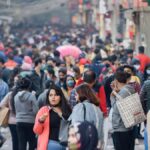A South Korean court on Sunday extended the detention of deposed President Yoon Suk Yeol for up to 20 days, sparking violent protests by hundreds of angry supporters who stormed the court building, smashed windows and broke into the interior.
Yoon last week became the first sitting South Korean president to be arrested as he faces insurrection allegations linked to his astonishing and short-lived Dec. 3 declaration of martial law that plunged the country into political turmoil.
Shortly after the court’s decision was announced on Sunday around 3 a.m. local time, his supporters invaded the building, overwhelming riot police who were trying to keep them at bay.
Footage showed protesters firing fire extinguishers at lines of police guarding the main entrance, before flooding the interior, destroying office equipment and furniture.
Police, who restored order hours later, said they had so far arrested 46 protesters.

“We will hunt down more of those who committed illegal acts or instigated and aided,” the Seoul Metropolitan Police said in a statement.
About 40 minor injuries were sustained during the chaos, but no serious injuries were reported, a rescue worker near the court said.
Yoon ‘could destroy evidence’, court says
South Korean investigators asked a Seoul court on Friday to detain him longer after he refused to be questioned.
After a five-hour hearing Saturday that Yoon attended, the Seoul Western District Court chose to grant investigators’ request due to “fear that the suspect may destroy evidence,” the court said in a press release.
Under the new arrest warrant, Yoon can be detained for up to 20 days. South Korean regulations require a suspect detained on a warrant to submit to a physical examination, have a photo taken and wear a prison uniform.
He is expected to continue to be held in a solitary confinement cell at the Seoul Detention Center.
Impeached South Korean President Yoon Suk Yeol was arrested and questioned Wednesday by authorities as part of a criminal investigation into the insurrection. He said he was only cooperating with what he called an illegal investigation to avoid violence. About 3,000 police officers were deployed to the Yoon presidential compound and brought wire cutters and ladders.
“President Yoon Suk Yeol and our legal team will never give up,” his lawyers, who called the criminal investigation invalid, said in a statement.
“We will do our best in all future legal proceedings to right the wrong,” the lawyers said, adding that the violence in court was an “unfortunate” incident.
Yoon’s conservative People Power Party (PPP) called the court’s decision “very unfortunate.”

“The question arises whether the repercussions of detaining a sitting president have been sufficiently considered,” the party said in a statement.
But the main opposition Democratic Party called the court’s approval of the arrest warrant a “cornerstone” for rebuilding order and said the “riots” by groups “of far right” would only worsen the national crisis.
Support for the PPP collapsed after Yoon declared martial law, which he rescinded hours later in the face of a unanimous Parliament vote rejecting it. Lawmakers impeached Yoon on Dec. 14, suspending his presidential powers.
South Korean investigators left the official residence of deposed President Yoon Suk Yeol on Friday after a nearly six-hour standoff in which he defied their attempt to arrest him. Jeremy Chan, senior analyst at Eurasia’s China and Northeast Asia group, says he is “deeply concerned” about the state of democracy in South Korea.
But in the turmoil that followed — during which the majority opposition parliament also impeached its first replacement and investigators botched an initial attempt to arrest Yoon — support for the PPP rebounded sharply.
His party trailed the opposition Democratic Party in support — 39 to 36 percent — for the first time since August, a Gallup Korea poll showed Friday.
Denying allegations that he orchestrated the insurrection, Yoon has so far obstructed efforts by the Corruption Investigation Bureau of senior officials to question him, refusing to be interviewed.

His lawyers argued that the arrest was illegal because the arrest warrant was issued in the wrong jurisdiction and the investigation team had no mandate to investigate.
Insurrection, the crime Yoon could be charged with, is one of the few for which a South Korean president does not have immunity and is technically punishable by death. However, South Korea has not executed anyone in almost 30 years.
Regardless of the criminal investigation that sparked Sunday’s chaos, the country’s Constitutional Court is deliberating whether to uphold the indictment and permanently impeach Yoon or restore his powers.










